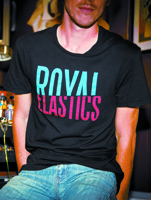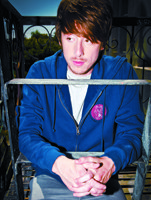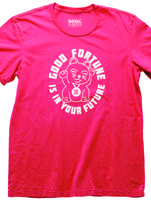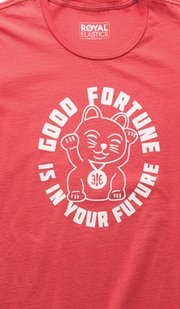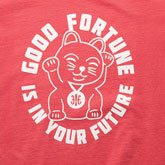Royal Elastics Made in LA
Working as a designer for Royal Elastics was chief creative officer John Bondoc’s first job out of design school, so when he had the opportunity to take over management of the brand from K-Swiss two years ago, he jumped at it.
“I reached out to my own network of people to take it over. I just didn’t want to give it up,” he said.
Two seasons ago, the company, known for its urban skate–inspired footwear, which uses elastic ties instead of shoelaces, expanded into apparel for the United States. Prior to that, they had started producing apparel for markets outside of the United States in 2005, with production based in Asia. Now, for the first time, starting with its Spring/Summer 2012 line, the company is doing all of its U.S. manufacturing in Los Angeles. Based in downtown Los Angeles’ Arts District, near Little Tokyo, Bondoc found he had plenty of manufacturing resources nearby.
“I thought it would be good if we tried to do everything domestic,” he said. “Our neighborhood is all apparel manufacturers and designers, and I thought it was a better way of working with our neighbors. We cut and sew everything—all our shirts, all our textiles are milled here.”
Although he had to fight a lot of people in the company over the decision to go local, it wound up improving quality and relationships, Bondoc said.
“It’s been more fun. We’ve gotten to work with cooler people, and just the level of expertise, especially grading sizes, has been great.”
The brand was started in 1996 by two Australians and was later bought by footwear giant K-Swiss in 2001. K-Swiss then sold Royal Elastics’ trademark and selected assets to REH, an investment group led by Bondoc, in 2009 for an undisclosed amount, although K-Swiss recorded a gain of $1.4 million in its second quarter of 2009.
Bondoc said brand recognition for Royal Elastics in the United States is still pretty small, but it is strong overseas, especially in Asia.
“’Made in the U.S.A.’ sells well, and selling it to our international distributors has been a real joy—especially Japanese guys. They love that stuff. They’re after a story. They’re after the truth in something.”
The brand takes its inspiration from the urban streets of downtown Los Angeles and the laid-back, effortless West Coast style, Bondoc said.
“There’s something so awesome about being in the Arts District downtown that’s really cool. There’s a lot of people doing cool things, and we really wanted to be a part of it. For us, it’s just sitting outside in our alley and having coffee with people in our building, and some of the coolest and best-dressed and most styling people are here.”
Bondoc describes the Spring/Summer collection as nautical and preppy but with a kick.
“Our preppy vibe still has teeth in it. It’s more of a slouchy preppy, more of a grunge to it,” he said.
And the company is introducing more color into the collection.
“In the last few seasons, there’s been a consensus in the industry to stay away from color, so we wanted to introduce color very slowly with bright blue, navy, red, greens hellip; but we’re still offering off-whites and blacks and striped navy linings for footwear.”
To keep prices in line, Bondoc jettisoned some of the more complicated silhouettes, which helped him concentrate on perfecting the construction.
“The fit is better,” he said. “I can’t even tell you how happy we are with the way it’s turned out, even the T-shirts. hellip; We’re so proud of all the stuff we’ve done and just working with local suppliers. We’re really a part of this community, and it feels good doing it.”
The new Spring/Summer line features graphic tees, hoodies and footwear for men and women in a range of bold, bright solids and patterns. The all-cotton apparel line is wholesale priced from $18 to $29 and channels the same street/skate/preppy vibe as seasons past. The laceless shoes, which wholesale for $25 to $60, come in a variety of reds, blues and neutrals in styles that represent a California take on the classic beach, dress and tennis shoe.
Royal Elastics is sold online and in stores such as Millennium, Sportie L.A. and Revolve Clothing. For the first time, the brand is including children’s shoes, and they continue to make some of their products vegan (no leather or animal-based materials) and have now opted to do away with denim jeans, as well as cursing in their logo stickers.
